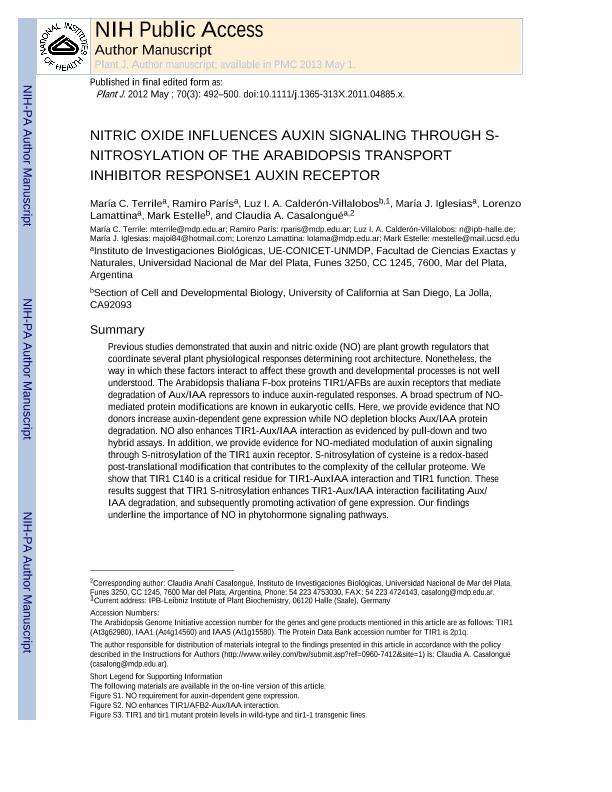Artículo
Nitric oxide regulates auxin signaling through s-nitrosylation of the Arabidopsis Transport Inhibitor Response1 auxin receptor
Terrile, Maria Cecilia ; Paris, Ramiro
; Paris, Ramiro ; Calderón Villalobos, Luz I. A.; Iglesias, María José
; Calderón Villalobos, Luz I. A.; Iglesias, María José ; Lamattina, Lorenzo
; Lamattina, Lorenzo ; Estelle, Mark; Casalongue, Claudia
; Estelle, Mark; Casalongue, Claudia
 ; Paris, Ramiro
; Paris, Ramiro ; Calderón Villalobos, Luz I. A.; Iglesias, María José
; Calderón Villalobos, Luz I. A.; Iglesias, María José ; Lamattina, Lorenzo
; Lamattina, Lorenzo ; Estelle, Mark; Casalongue, Claudia
; Estelle, Mark; Casalongue, Claudia
Fecha de publicación:
05/2012
Editorial:
Wiley
Revista:
Plant Journal
ISSN:
0960-7412
Idioma:
Inglés
Tipo de recurso:
Artículo publicado
Clasificación temática:
Resumen
Previous studies have demonstrated that auxin (indole-3-acetic acid) and nitric oxide (NO) are plant growth regulators that coordinate several plant physiological responses determining root architecture. Nonetheless, the way in which these factors interact to affect these growth and developmental processes is not well understood. The Arabidopsis thaliana F-box proteins TRANSPORT INHIBITOR RESPONSE 1/AUXIN SIGNALING F-BOX (TIR1/AFB) are auxin receptors that mediate degradation of AUXIN/INDOLE-3-ACETIC ACID (Aux/IAA) repressors to induce auxin-regulated responses. A broad spectrum of NO-mediated protein modifications are known in eukaryotic cells. Here, we provide evidence that NO donors increase auxin-dependent gene expression while NO depletion blocks Aux/IAA protein degradation. NO also enhances TIR1-Aux/IAA interaction as evidenced by pull-down and two-hybrid assays. In addition, we provide evidence for NO-mediated modulation of auxin signaling through S-nitrosylation of the TIR1 auxin receptor. S-nitrosylation of cysteine is a redox-based post-translational modification that contributes to the complexity of the cellular proteome. We show that TIR1 C140 is a critical residue for TIR1–Aux/IAA interaction and TIR1 function. These results suggest that TIR1 S-nitrosylation enhances TIR1–Aux/IAA interaction, facilitating Aux/IAA degradation and subsequently promoting activation of gene expression. Our findings underline the importance of NO in phytohormone signaling pathways.
Archivos asociados
Licencia
Identificadores
Colecciones
Articulos(IIB)
Articulos de INSTITUTO DE INVESTIGACIONES BIOLOGICAS
Articulos de INSTITUTO DE INVESTIGACIONES BIOLOGICAS
Citación
Terrile, Maria Cecilia; Paris, Ramiro; Calderón Villalobos, Luz I. A.; Iglesias, María José; Lamattina, Lorenzo; et al.; Nitric oxide regulates auxin signaling through s-nitrosylation of the Arabidopsis Transport Inhibitor Response1 auxin receptor; Wiley; Plant Journal; 70; 3; 5-2012; 492-500
Compartir
Altmétricas



